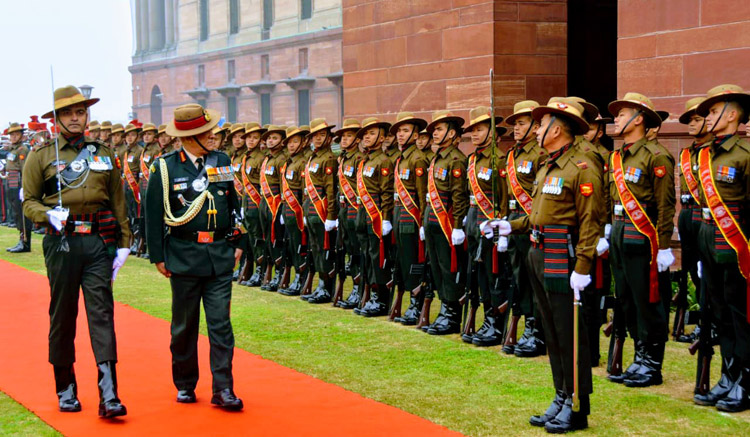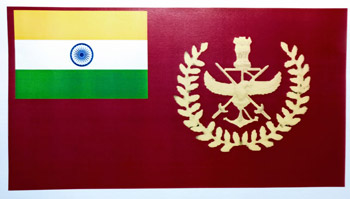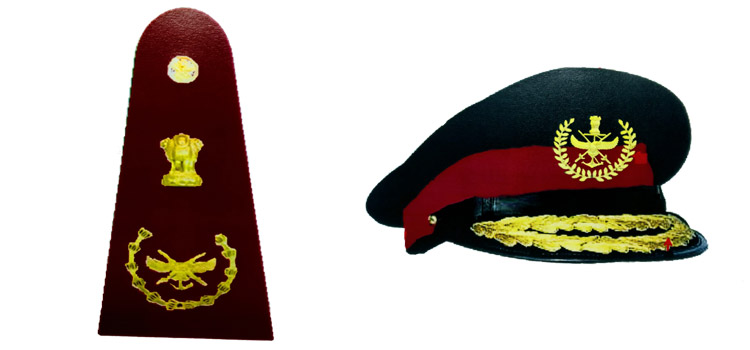- Prime Minister Narendra Modi inaugurates Aero India 2023 in Bengaluru; Releases Commemorative Stamp
- Defence Secretary meets delegations from Saudi Arabia, USA and Oman on the sidelines of Aero India 2023
- Foreign Ministers of 32 countries to attend Aero India 2023
- Embraer showcases the C-390 Millennium at Aero India 2023
General Rawat is India's first Chief of Defence Staff
Biggest reform in higher defence management rolled out with mandate to restructure military commands, bring about jointness among Armed Forces within 3 years.

The biggest reform in India's higher Defence management was rolled out on December 30, with the Government announcing the appointment of General Bipin Rawat as the first Chief of Defence Staff (CDS) to helm the effort to integrate the functioning of the armed forces.
In a brief late night announcement just hours before his scheduled retirement as Chief of Army Staff, the Government on December 31, General Rawat was named CDS with effect from December 31 on extension of service.
Significantly, the announcement did not specify the length of tenure, cryptically mentioning that General Rawat would serve in this position "until further orders".
The charter of roles and responsibilities requires the CDS to "bring about jointness in operations, logistics, transport, training, support services, communications, repairs and maintenance, etc, of the three Services within three years of the first CDS assuming office"

"Government has decided to appoint General Bipin Rawat, as the Chief of Defence Staff (CDS) with effect from December 31, 2019 and until further orders and extension in service of General Bipin Rawat with December 31, 2019 and till such period he holds the office of CDS," the Ministry of Defence stated in a press release.
Earlier, on December 30, the Government announced an Amendment to Army, Navy and Air Force Rules, extending the age of retirement of a four-star officer from 62 to 65 years while serving as CDS.
General Rawat will formally take over as CDS on January 1. His appointment was widely welcomed in military circles.
While it is explicit that he will not have command over forces or the Service Chiefs, the CDS through the Department of Military Affairs has been mandated to "facilitate restructuring of military commands for optimal utilisation of resources by bringing about jointness in operations, including through establishment of joint/threatre commands"
The CDS will head a newly-created Department of Military Affairs with the mandate to facilitate "Integration, Collaboration, Convergence and Rationalisation" among the three armed forces.
The charter of roles and responsibilities requires the CDS to "being about jointness in operations, logistics, transport, training, support services, communications, repairs and maintenance, etc, of the three Services within three years of the first CDS assuming office".
He will also concurrently wear the hat of permanent chairman, Chiefs of Staff Committee, giving him the status of first among equals vis-a-vis the three service chiefs but not exercise command over the Service Chiefs, who shall continue to command and administer their respective Services independently.

The CDS will also be the Secretary, Department of Military Affairs, the fifth department under the Ministry of Defence, the setting up of which will trigger a major re-structuring within the Ministry of Defence. The Armed Forces - which have so far been treated as attached offices of the Ministry of Defence - will now be under the ambit of the Department of Military Affairs.
The CDS will also be the Secretary, Department of Military Affairs, the fifth department under the Ministry of Defence, the setting up of which will trigger a major re-structuring within the Ministry of Defence. The Armed Forces - which have so far been treated as attached offices of the Ministry of Defence - will now be under the ambit of the Department of Military Affairs
The tasking for the office of CDS will be to function as the principal military advisor to the Defence Minister and "to bring about jointness between the armed forces of the country in training, procurement, staffing and operations". The three Service Chiefs shall continue to advise the Defence Minister on matters pertaining to their domain.
While it is explicit that he will not have command over forces or the Service Chiefs, the CDS through the Department of Military Affairs has been mandated to "facilitate restructuring of military commands for optimal utilisation of resources by bringing about jointness in operations, including through establishment of joint/threatre commands".
The command caveat extends to tri-service organisations like the Strategic Forces Command and the Andaman and Nicobar Command, which were so far reporting to the chairman, Chiefs of Staff Committee. While the CDS will "administer" tri-service organisations, "their military command will be with the Chief of the duly notified Service, which has a predominant role in effective functioning of that specific tri-service organization". However, tri-services agencies related to Cyber and Space will be under the command of the CDS.
The meat of his role will be to assign inter-service priority to military procurements and, as such, determine the Capital allocations for the three Services in the Defence Budget. For discharging this role, the CDS will be a member of the Defence Acquisition Council and the Defence Planning Committee.
The Department of Military Affairs led by the CDS will have a mix of military and civilian officers. In his role as permanent chairman, Chiefs of Staff Committee, the Integrated Defence Staff will report to General Rawat.
The meat of his role will be to assign inter-service priority to military procurements and, as such, determine the Capital allocations for the three Services in the Defence Budget. For discharging this role, the CDS will be a member of the Defence Acquisition Council and the Defence Planning Committee.
Prime in the charter of roles and responsibilities for the apex military officer is to "implement Five-Year Defence Capital Acquisition Plan (DCAP), and Two-Year roll-on Annual Acquisition Plans (AAP), as a follow-up of Integrated Capability Development Plan (ICDP)".
Promotion of the use of indigenous equipment and, by extension, the Make in India agenda will also be high on priority.
Prime in the charter of roles and responsibilities for the apex military officer is to "implement Five-Year Defence Capital Acquisition Plan (DCAP), and Two-Year roll-on Annual Acquisition Plans (AAP), as a follow-up of Integrated Capability Development Plan (ICDP)".
But the CDS will not by himself or through the Department of Military Affairs have financial powers for procurements, which as a function shall remain with the Ministry of Defence and the Service Headquarters.
"Work exclusively pertaining to Military matters will fall within the purview of the Department of Military Affairs, while the Department of Defence will deal with larger issues pertaining to defence of the country," the concept note for CDS states.
The charter of roles and responsibilities requires the CDS to "being about jointness in operations, logistics, transport, training, support services, communications, repairs and maintenance, etc, of the three Services within three years of the setting up of the office of CDS.
The charter also gives the CDS the role of evaluating plans for 'Out of Area Contingencies' and Humanitarian Assistance and Disaster Relief operations. His office will also have autority to integrate and rationalise international cooperation plans, including military exercises with foreign militaries.





